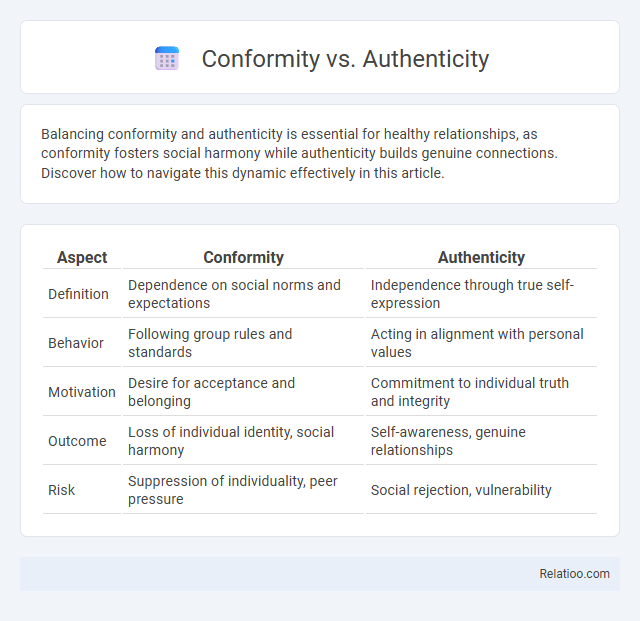Balancing conformity and authenticity is essential for healthy relationships, as conformity fosters social harmony while authenticity builds genuine connections. Discover how to navigate this dynamic effectively in this article.
Table of Comparison
| Aspect | Conformity | Authenticity |
|---|---|---|
| Definition | Dependence on social norms and expectations | Independence through true self-expression |
| Behavior | Following group rules and standards | Acting in alignment with personal values |
| Motivation | Desire for acceptance and belonging | Commitment to individual truth and integrity |
| Outcome | Loss of individual identity, social harmony | Self-awareness, genuine relationships |
| Risk | Suppression of individuality, peer pressure | Social rejection, vulnerability |
Understanding Conformity: Definition and Origins
Conformity involves aligning your behaviors, beliefs, or attitudes to match those of a group or social norm, often driven by the need for acceptance or fear of rejection. This phenomenon originates from social influence theories such as normative and informational social influence, which explain why people conform to fit in or because they believe others' perspectives are more accurate. Understanding conformity helps you recognize the balance between maintaining authenticity and the human desire for social approval.
Authenticity Explained: What Does It Mean?
Authenticity means embracing and expressing your true self, values, and beliefs without succumbing to external pressures for conformity or approval. It involves self-awareness and honesty, allowing genuine actions and decisions that reflect your inner identity rather than societal expectations. Authenticity fosters personal growth and deeper connections, standing in contrast to approval-seeking behaviors that prioritize others' validation over individual truth.
Psychological Roots of Conformity
The psychological roots of conformity stem from an inherent desire for social acceptance and fear of rejection, often driven by the brain's reward system activating when individuals align with group norms. Social Identity Theory explains that conformity fulfills the need to belong, enhancing self-esteem by adopting behaviors and beliefs consistent with a valued group. Cognitive dissonance also plays a role, as individuals adjust attitudes to reduce discomfort caused by conflicting personal and group standards.
The Value of Authenticity in Modern Society
Authenticity in modern society fosters genuine self-expression and strengthens interpersonal trust, setting a foundation for meaningful connections that transcend superficial approval seeking. Prioritizing authenticity over conformity unlocks individual creativity and resilience, which are vital for personal growth and social innovation. The value of authentic behavior lies in its empowerment of individuals to navigate societal pressures while maintaining personal integrity and psychological well-being.
Social Pressure: How It Shapes Behavior
Social pressure influences conformity by encouraging individuals to align their behavior with group norms to gain social acceptance and avoid rejection. Authenticity often conflicts with social pressure because expressing one's true self can risk disapproval or exclusion from the group. Approval seeking drives behavior changes as individuals prioritize external validation over personal values, leading to compromises in authenticity to maintain social harmony.
Benefits and Drawbacks of Conformity
Conformity offers the benefit of social harmony, making it easier for you to fit into groups and avoid conflicts by aligning with shared norms and expectations. However, excessive conformity can lead to a loss of personal authenticity, reducing your ability to express unique beliefs and potentially causing long-term dissatisfaction. Balancing conformity with authenticity ensures you gain social approval without compromising your true self.
The Importance of Staying True to Yourself
Staying true to yourself is vital for maintaining authenticity and fostering self-respect, as conformity often pressures you to abandon your core values to gain approval from others. Pursuing approval at the expense of your true identity can lead to internal conflict and diminished self-esteem, making it essential to balance social acceptance with genuine self-expression. Embracing your unique beliefs and preferences ensures emotional well-being and long-term fulfillment beyond the transient approval of external sources.
Balancing Authenticity and Social Acceptance
Balancing authenticity and social acceptance involves embracing your true self while navigating societal expectations and norms. You can maintain personal integrity by expressing core values and beliefs authentically, yet adapt behaviors to foster positive relationships and community belonging. Striking this balance reduces approval-seeking behaviors and enhances genuine connections without sacrificing individuality.
Overcoming Barriers to Authentic Living
Overcoming barriers to authentic living requires recognizing the detrimental effects of conformity and approval seeking on personal identity. Cultivating self-awareness and setting boundaries helps individuals resist societal pressures and align actions with intrinsic values. Embracing vulnerability and practicing assertiveness fosters genuine connections and empowers authentic self-expression.
Practical Tips for Embracing Authenticity Over Conformity
Embracing authenticity over conformity requires you to identify your core values and consistently align your actions with them, even when faced with social pressure. Practice setting boundaries and saying no to approval-seeking behaviors that compromise your true self, allowing your individuality to flourish. Surround yourself with supportive individuals who appreciate your genuine qualities, reinforcing your confidence in authenticity.

Infographic: Conformity vs Authenticity
 relatioo.com
relatioo.com